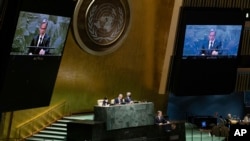More than five decades ago, at the height of the Cold War, representatives of 18 nations drafted the Treaty on the Non-Proliferation of Nuclear Weapons, or NPT. In the years that followed, nearly every country in the world joined the NPT.
The NPT has made the world safer, as nuclear weapons states took steps to reduce their stockpiles. However, the treaty is under increasing strain, said Secretary of State Antony Blinken in a speech to the Nuclear Non-Proliferation Treaty Review Conference. He noted that the DPRK continues to expand its unlawful nuclear program and continues its ongoing provocations against the region.
Iran also remains on a path of nuclear escalation. Although it publicly claims to favor a return to the Joint Comprehensive Plan of Action, or JCPOA, since March, Iran has been unwilling to accept such a deal. Secretary Blinken affirmed that “getting back to the JCPOA remains the best outcome – for the United States, for Iran, for the world.”
Russia’s ongoing war of aggression against Ukraine is a brazen violation of international law. But its actions also violate the assurances that it provided to Ukraine in the 1994 Budapest Memorandum. Under the terms of the memorandum, which welcomed Ukraine’s accession to the Non-Proliferation Treaty and its commitment to remove all nuclear weapons from its territory, Russia committed to respect Ukraine’s independence and territorial integrity. This sends the worst possible message to countries around the world that may think they need to have nuclear weapons to protect their sovereignty.
“There is no place in our world for nuclear deterrence based on coercion, intimidation, or blackmail,” declared Secretary Blinken:
“Together with the United Kingdom and France, we’ve released a set of principles and best practices that should be expected of every responsible NPT nuclear weapon state, among them that every effort has to be made to ensure that nuclear weapons are not used again.
The United States is committed to avoiding costly arms races and facilitating arms control arrangements wherever they are possible. Indeed, President Biden negotiated to extend the New START Treaty with Russia until 2026. President Biden also reiterated his readiness to negotiate a framework to replace New START.
The fundamental role of U.S. nuclear weapons is to deter nuclear attacks on the United States, its allies, and partners. The United States would only consider the use of such weapons in extreme circumstances to defend its vital interests.














